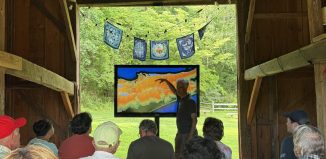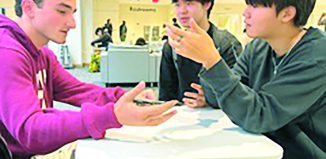D. None of the Above: Offering encouragement to students in our communities
By Daniel Dunaief

We need people around us for a host of reasons.
We have the kind of division of labor that makes it possible for someone like me with no mechanical skills whatsoever to fix, repair, install or replace something we need, like a dishwasher or roof, to pick up the phone and call a specialist who can do the job.
We also need people to provide the kind of food we don’t grow or cook ourselves and to ship that food across the country or the world.
How would we people watch without people strutting, holding hands, barking commands on cell phones, or pausing to take a giant mouthful of hot pizza?
We also need people for social and emotional reasons.
It’s helpful to have someone who can tell you whether your shoes match your outfit, who can point out if you have food in your teeth, or who can nix your idea to share a risqué joke with your boss.
We go through stages in life when our social needs rise and fall, depending on our age, vulnerabilities, and emotional equanimity.
I have several friends whose children are living through different phases in life, entering and leaving colleges, changing jobs or location, and starting or ending serious relationships.
When people in unfamiliar settings first settle into a new routine, they can feel vulnerable, disconnected, and incredibly lonely.
Making matters worse, they see other people around them laughing with friends, moving in a group, or chatting animatedly on the phone. Social media doesn’t help, as they can see pictures of other people having the times of their lives on other college campuses, surrounded by their new friends, while they look to the vacant space to the left and right of them.
These transitionary periods can make people feel as if they are the only ones without an invitation to an incredible party on the other side of the fence. They can hear music and laughter, they can smell the barbecued chicken, and they can see the flickering lights.
It’s as if a magnetic attraction drew everyone else together, while that same force repelled them, making them outsiders in their towns and universities.
While most young people can and do find comfort from companionship, the time when they feel as if they are on their own can seem extraordinarily long.
That’s where we come in.
You see, we are surrounded by students who are going to college, have returned for a few days or longer, or who have graduated and are trying to find their place in the world.
Some of them want or need nothing from us, as they glide effortlessly between their professional or academic responsibilities and their recharging social contacts.
Others, however, may be too unnerved or unsure to ask for help or to try to get what they may not even acknowledge they need.
The cost of offering an encouraging word, of asking about a student who is rounding up grocery carts in a parking lot, is restocking shelves at a department store or who is taking our order at a fast food restaurant is low.
Most of us are creatures of habit. We tend to go to the same places to eat, to buy our food, or to get our hardware store supplies.
When we go to those stores, we might see those same familiar faces, some of whom might be hiding behind extra long bangs or appear to be staring at their phones or shoes.
We don’t have to become best friends with any of them, and we don’t need to pull up a chair and ask their life stories.
We can, however, spend more than a few seconds getting whatever we need. We can ask how school is going, about the products they are selling or about the changing weather.
Those contacts, brief though they may be, could provide the kind of connection that offers them more of what they needed than whatever we purchased for ourselves in a store.
And who knows? Maybe our awkward attempts to offer some unsolicited connection can give them a good story to tell their current or future friends.
Surrounded by people, we can sometimes feel even more disconnected than we might if we were alone. Let’s try not to be too distracted to notice what someone else might need an encouraging or supportive word or two.
Students are not like the cracks in the sidewalk or the contour of a winding road: they may benefit from something we can and should consider sharing and that doesn’t cost anything more than our time and consideration.







